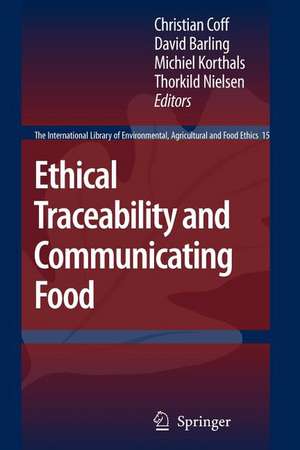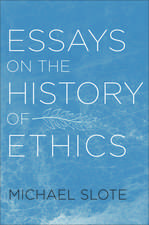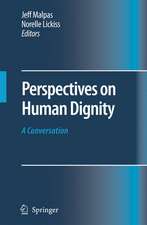Ethical Traceability and Communicating Food: The International Library of Environmental, Agricultural and Food Ethics, cartea 15
Editat de Christian Coff, David Barling, Michiel Korthals, Thorkild Nielsenen Limba Engleză Paperback – 22 noi 2010
| Toate formatele și edițiile | Preț | Express |
|---|---|---|
| Paperback (1) | 1110.24 lei 43-57 zile | |
| SPRINGER NETHERLANDS – 22 noi 2010 | 1110.24 lei 43-57 zile | |
| Hardback (1) | 1116.40 lei 43-57 zile | |
| SPRINGER NETHERLANDS – 22 iun 2008 | 1116.40 lei 43-57 zile |
Din seria The International Library of Environmental, Agricultural and Food Ethics
- 15%
 Preț: 707.96 lei
Preț: 707.96 lei -
 Preț: 451.76 lei
Preț: 451.76 lei - 18%
 Preț: 731.10 lei
Preț: 731.10 lei - 18%
 Preț: 744.53 lei
Preț: 744.53 lei - 18%
 Preț: 899.87 lei
Preț: 899.87 lei - 18%
 Preț: 1831.27 lei
Preț: 1831.27 lei - 15%
 Preț: 644.82 lei
Preț: 644.82 lei - 15%
 Preț: 643.16 lei
Preț: 643.16 lei - 18%
 Preț: 947.04 lei
Preț: 947.04 lei - 18%
 Preț: 953.20 lei
Preț: 953.20 lei - 15%
 Preț: 646.62 lei
Preț: 646.62 lei - 15%
 Preț: 646.75 lei
Preț: 646.75 lei - 18%
 Preț: 1116.40 lei
Preț: 1116.40 lei - 15%
 Preț: 643.99 lei
Preț: 643.99 lei - 18%
 Preț: 953.65 lei
Preț: 953.65 lei - 15%
 Preț: 645.28 lei
Preț: 645.28 lei - 15%
 Preț: 637.28 lei
Preț: 637.28 lei - 18%
 Preț: 786.66 lei
Preț: 786.66 lei - 15%
 Preț: 644.30 lei
Preț: 644.30 lei -
 Preț: 398.74 lei
Preț: 398.74 lei - 18%
 Preț: 902.69 lei
Preț: 902.69 lei - 24%
 Preț: 697.64 lei
Preț: 697.64 lei -
 Preț: 388.52 lei
Preț: 388.52 lei - 20%
 Preț: 570.97 lei
Preț: 570.97 lei - 18%
 Preț: 784.61 lei
Preț: 784.61 lei - 15%
 Preț: 527.79 lei
Preț: 527.79 lei - 24%
 Preț: 635.52 lei
Preț: 635.52 lei - 15%
 Preț: 647.08 lei
Preț: 647.08 lei
Preț: 1110.24 lei
Preț vechi: 1353.95 lei
-18% Nou
Puncte Express: 1665
Preț estimativ în valută:
212.51€ • 230.91$ • 178.63£
212.51€ • 230.91$ • 178.63£
Carte tipărită la comandă
Livrare economică 21 aprilie-05 mai
Preluare comenzi: 021 569.72.76
Specificații
ISBN-13: 9789048179008
ISBN-10: 9048179009
Pagini: 344
Ilustrații: XXVI, 318 p.
Dimensiuni: 155 x 235 x 18 mm
Greutate: 0.49 kg
Ediția:Softcover reprint of hardcover 1st ed. 2008
Editura: SPRINGER NETHERLANDS
Colecția Springer
Seria The International Library of Environmental, Agricultural and Food Ethics
Locul publicării:Dordrecht, Netherlands
ISBN-10: 9048179009
Pagini: 344
Ilustrații: XXVI, 318 p.
Dimensiuni: 155 x 235 x 18 mm
Greutate: 0.49 kg
Ediția:Softcover reprint of hardcover 1st ed. 2008
Editura: SPRINGER NETHERLANDS
Colecția Springer
Seria The International Library of Environmental, Agricultural and Food Ethics
Locul publicării:Dordrecht, Netherlands
Public țintă
ResearchCuprins
Regulation, Governance and Narrative Strategies of Food Traceability.- Ethical Traceability and Informed Food Choice.- The European Union and the Regulation of Food Traceability: From Risk Management to Informed Choice?.- Governing and Governance in the Agri-Food Sector and Traceability.- Narrative Strategies in Food Advertising.- Ethical Traceability in Three Food Supply Chains: Case Studies of Danish Bacon, UK Wheat-Bread and Greek Olive Oil.- Ethical Traceability in the Bacon Supply Chain.- Ethical Traceability in the UK Wheat-Flour-Bread Chain.- Traceability and Ethical Traceability in the Greek Olive Oil Chain.- Ethical Traceability and its Philosophical Implications for Civil Society, Market, State and Democracy.- Challenges of Ethical Traceability to the Public-Private Divide.- Traceability of Animal Welfare: Market or State, Good or Right?.- Consumer Rights to Food Ethical Traceability.- Ethical Traceability and Ethical Room for Manoeuvre.- Interpreting Traceability: Improving the Democratic Quality of Traceability.- Conclusions and Outlook.- Communicating Ethical Traceability.- Conclusions and Policy Options.
Textul de pe ultima copertă
Traceability – the ability to track a product from farm to plate – is now widely used in the food sector for a range of purposes: it allows companies to improve efficiency, facilitates product recall, and helps producers flag the specific characteristics of their goods. But traceability systems are mainly designed and used by the people directly involved in the food chain. The people at the end of the food chain – food consumers – have little say in which attributes are traced, and can rarely access the information stored in traceability systems.
This book draws on philosophical discourses (like ethics, political philosophy and philosophy of law) around food ethics and empirical research in three important food chains (UK bread, Danish bacon and Greek olive oil) to argue that ethical traceability systems could be used to communicate food information to consumers, allowing them not only to make food choices consistent with their own values, but also to play a more informed role in the way food is produced and distributed. It will appeal to academics, students and policy makers with an interest in traceability, food ethics and food policy.
This book draws on philosophical discourses (like ethics, political philosophy and philosophy of law) around food ethics and empirical research in three important food chains (UK bread, Danish bacon and Greek olive oil) to argue that ethical traceability systems could be used to communicate food information to consumers, allowing them not only to make food choices consistent with their own values, but also to play a more informed role in the way food is produced and distributed. It will appeal to academics, students and policy makers with an interest in traceability, food ethics and food policy.
Caracteristici
Covers a topic that is currently high on the agenda of the food industry and policy makers The first book to link traceability (which is proliferating in food chains) to the ethics of food production, hence ethical traceability Uniquely, it approaches the subject from three angles: It looks at the philosophical underpinnings of food ethics It examines the role of traceability in contemporary food governance It investigates the practicalities of applying traceability to production ethics in three important food chains Explores the possibilities for using ethical traceability to communicate with consumers, to help them make informed choices















